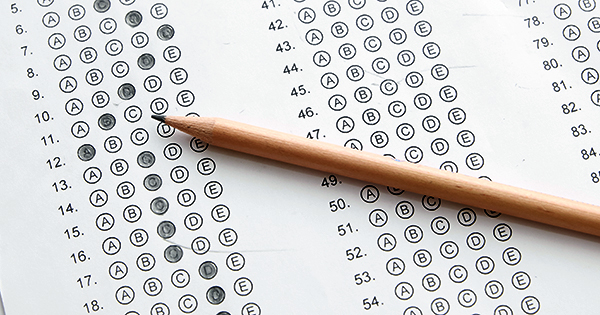Standardization Fails the Test
Too often, students are measured by their test scores instead of their achievements when applying for colleges.

Standardized test form with answers bubbled in and a pencil, focus on anser sheet
September 17, 2018
Across the nation, students are beginning the college application process. Juniors and seniors alike are preparing to take standardized tests like the SAT and ACT in order to better their chances of attending their college of choice. Many will take these tests time and time again, because in the current education system, an inordinate amount of value is placed on test scores. Diminishing the influence that testing has over the college admissions process would allow for a more accurate assessment of the intelligence and skills of individual students, creating more opportunities for deserving students to attend their choice school.
Standardized tests like the SAT and ACT are based primarily on English and mathematics, failing to account for other areas of proficiency. Students who excel in subjects like history, science, or art are put at a disadvantage – it is unfair to measure a talented artist and a brilliant mathematician on the same test, particularly when that test caters to the mathematician. A more accurate way to measure intelligence might be to examine the grade a student received in their best class or what they scored on the AP test for that subject. Students are only expected to study one specific subject in college; it is unnecessary to test them in other subject areas if they will not be required to continue to study those subjects.
A particularly destructive part of standardized testing lies in the advantages it provides to an already privileged demographic of students. Those who live in nicer neighborhoods already are more likely to attend better schools, but placing so much importance on a single standardized test supplies them with an even more distinct advantage: access to tutors. As long as there are those who make a living by teaching children of wealthy parents how to do well on standardized tests and there are wealthy parents who are willing to pay for their services, standardized testing can never be a fair or accurate way of determining college readiness; it is simply another capitalistic venture. Those at a socioeconomic disadvantage not only might not have access to good schools or tutors, they also might struggle to find enough time to take the test. The majority of my friends took the SAT and ACT multiple times in order to achieve their desired score This was not done at school, they had to set aside their own time to retake the tests. Finding the time to do this might be more difficult for students who have to work in order to support themselves or their families.
Some might argue that these tests do have merit, as there needs to be a standard to measure a student’s likelihood of success in college, however, the SAT and ACT do not do so accurately. There and indeterminable amount of factors that could affect a student’s performance on a test on any given day: lack of sleep, stress at home, or not having access to a tutor or any way to prepare are just a few. One test cannot determine a student’s success in college, therefore a true standard is unachievable. There are other more important factors like work ethic, which is reflected in grades, and an understanding of time management, which can be gained through participation in extracurricular activities. Four years of high school education cannot be condensed into a test spanning mere hours. No one who has involved themselves in their school and community while earning good grades should ever have to worry about getting into the college of their choice, but unfortunately that is not the case. The whole student must be taken into account, because their life experiences define them more than a test score does.

